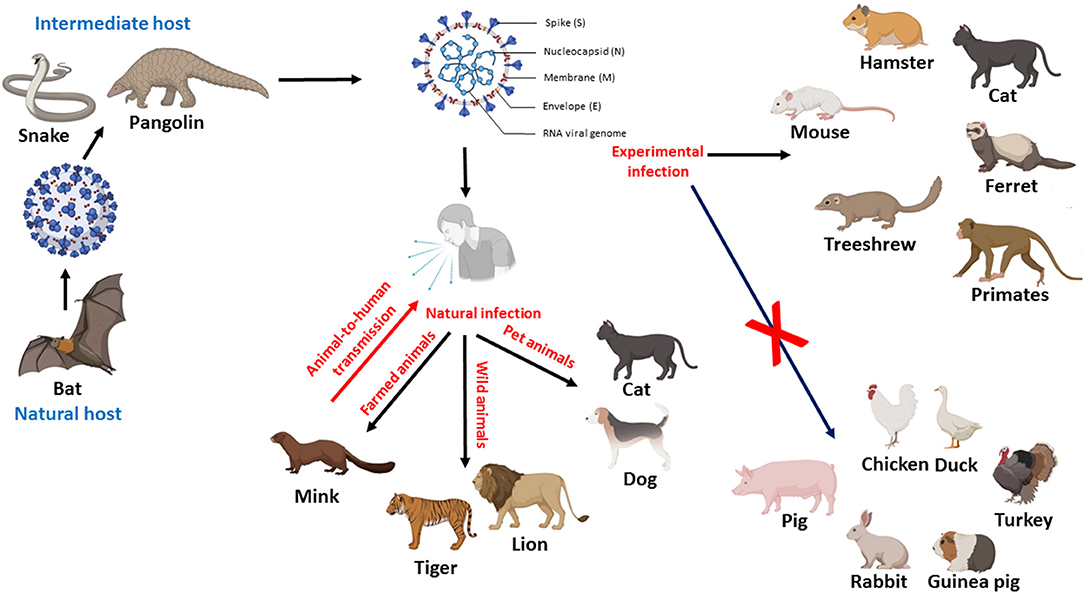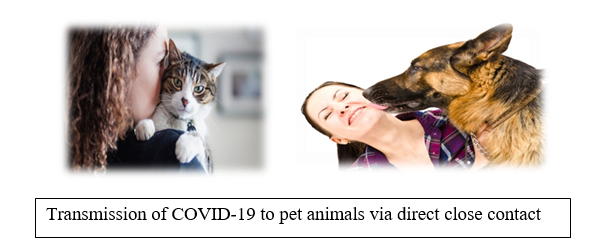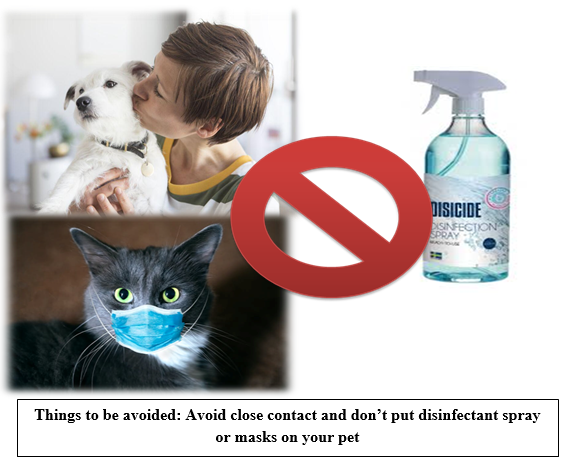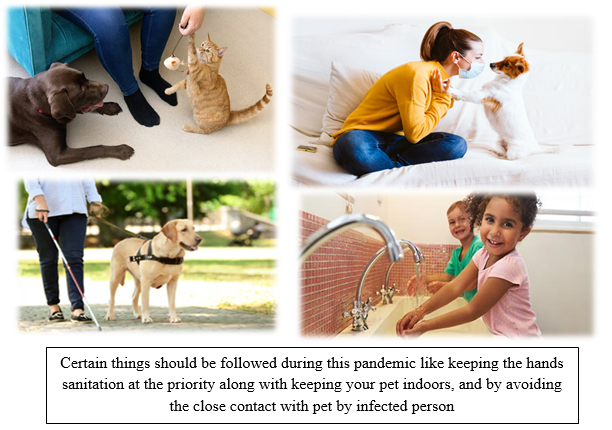The virus COVID-19 (SARS-CoV-2) appears to have emerged initially from an animal source, but the current spread of COVID-19 is a result of human-to-human transmission. According to the World Health Organization (WHO), “there is no conclusive evidence that a dog, cat, or livestock can transmit COVID-19” to date. During this pandemic emergency, animals and people both need the care and support of each other. Therefore, the World Organization for Animal Health (WOAH) stresses that, at this time, “it is important not to give in to anxiety and to keep on providing loving care for our pets.” So, we need to continue taking measures for the welfare and upkeep of the companion animals. Also, pet animals are helping in COVID-19 detection in humans through their sniffing capacity with an average of 94-100 % accuracy. They can smell urine, sweat, and any secretions of Covid-19 patients.
Picture Source: An Overview of SARS-CoV-2 and Animal Infection Click Here
Is the COVID-19 zoonotic?
YES. There have been various reports of the human-animal transmission of SARS-CoV 2 virus infection in animals like dogs, cats, tigers, lions, and mink. 1st case of 2 dogs and one cat affected by this virus was reported in Hong Kong on 5th March 2020 (Islam, 2020). After that, many cases were reported from several countries like Belgium, New York, etc. In India, it was first reported from Vandalur zoo in Tamil Nadu in which 9 yr old lioness “NEELA” died due to Covid-19, and the Asiatic lion “PATHBANATHAN” succumbed to Covid in June 2021.
But, till now, there has been no report of transmission of infection from pet animals to humans. So, keep your pet animals the same way you usually take care of them.
How does the transmission of COVID-19 occur in pet animals?
Infection to pet animals can occur via direct close contact with an infected person or while providing the feed to the pet as the virus is excreted in the infected human’s body secretions while sneezing, coughing, aerosols, etc
What are the symptoms of SARS-CoV 2 infection in animals?
The symptoms in animals depend on the species. Several species, including cats (domestic and exotic), mink, dogs, and non-human primates, have all tested positive for the virus after exposure to a human with known or suspected SARS-CoV-2. Cats and mink are more likely to become symptomatic than dogs, and mink appear to have an increased likelihood of dying.
The symptoms may vary from asymptomatic to mild signs that involve fever, lethargy, respiratory distress, exercise intolerance, coughing, nasal discharge, or gastrointestinal signs like diarrhea, vomiting, etc.
Is the diagnostic testing for SARS-CoV 2 required in pet animals?
First of all, if you suspect a Covid-19 infection in your pet, consult the veterinarian as other most common diseases also cause similar types of signs. It is important to exclude other diseases first rather than directly thinking of Covid-19.
As such routine testing is not required for pet animals. Also at present, there is no single standardized and reliable test for animals to detect Covid-19.
Can animals transmit the new coronavirus to people?
The current Covid-19 pandemic is clearly a human-to-human spread of the coronavirus. Although the exact origin of the pandemic is unknown, it is likely that the virus initially jumped from an animal species to a human, and then human-to-human spread became the primary mechanism of transmission. Based on the information available, the risk of animals spreading Covid-19 to people is considered to be low. There are no documented cases of dogs or cats spreading the virus to people.
Is there any vaccine for pet animals?
An inactivated vaccine named “Carnivac-Cov” has been developed as the first vaccine for animals by researchers of Russia from the Federal Service for Veterinary and Phytosanitary Surveillance. Initially, this vaccine underwent research trials on arctic foxes, cats, rats, mink, and other species in 2020 (Team, 2021). On the basis of promising results obtained by the researchers, the efficacy of the vaccine has been claimed to last up to 6 months. This is a great effort by researchers to prevent animal-to-human transmission and future preparedness (Chavda et al., 2021). Till now, this vaccine is not available in India. Therefore, the most important thing is to protect your pets by taking basic preventive measures. The routine vaccination against canine and feline coronavirus for pet animals doesn’t provide cross-immunity against SARS-CoV 2.
If I am diagnosed with Covid-19, how do I protect my pet?
It is recommended that anyone sick with Covid-19 should maintain separation from household pets and other animals. When possible, have another member of your household care for your animals while you are sick. You should avoid close contact with your pet, like petting, snuggling, being kissed or licked, and sharing food. If you are sick, always wear a mask during your pet care activities and wash your hands before and after you interact with pets.
What precautions should be taken while walking your dog outside?
- Take your dog for a walk so that it can relieve itself. But these walks should be short and without coming in contact with other animals or people.
- Make them stand on a newspaper, and ensure they are not coming into contact with common-area surfaces like lift walls or corridors, where there is a chance for contamination.
- Prefer the hours when fewer people are around to avoid contact.
Does Covid-19 also affect the physical and mental health of pets, especially dogs?
A dog’s well-being depends on three fundamental aspects: physical exercise, exploring the surroundings, and social interaction.
Plan a series of activities that anybody can do at home in order to stimulate and maintain the dog’s well-being, viz.:
- Playing is a great way to make sure your dogs get physical exercise.
- Play at least twice a day for 15 to 20 minutes each time.
- A good way to start would be teaching them simple instructions like sit and stay and gradually work your way into more complex tasks.
- Use different kinds of toys like doggy puzzle toys etc.
- Play indoor games or have indoor activities by training your dog to use the treadmill.
- Mental stimulation can help your dog manage the anxiety of a new routine, less exercise, and the residual stress from family members during these challenging times.
- Ensure they get a little sunshine, fresh air, and some indoor exercise.
- Don’t let them overeat, and teach them some new tricks.
Should my pet wear a face mask in public?
No. Face masks may not protect your pet from disease transmission and can cause breathing difficulties.
Should I apply sanitizers to the pet’s skin?
Don’t put any disinfecting sprays on pets, as there have not been any transmission reports through the skin, fur, etc.
Should I wear a face mask?
The CDC recommends wearing a mask in public settings around people who don’t live in your household and when you can’t stay 6 feet away from others (e.g., grocery stores and pharmacies), especially in areas of significant community-based transmission. Masks help to stop the spread of COVID-19 to others.
Advice to pet parents during these difficult times:
- Try to keep your pet indoors.
- If you want to take it out, then make your pet walk at least 6 feet away from others.
- Wash their paws with warm water and soap and brush their fur down thoroughly.
- Give your dog regular baths with hot water and check its nails for unusual growth or dirt.
- Disinfect all equipment correctly (leash, collar, etc.) and leave it at the door entrance.
- A high quality, whole foods, preferably milk and meat-based diet will help ensure a healthy coat and good energy
- Try to keep them hydrated with clean and fresh water accessible at all times.
- Do not use face masks on pets, as they may asphyxiate them.
- Wash your hands with soap and water for 20 seconds before and after your contact with pets.
- Create a better routine with the cats and dogs.
- Teach your pets new skills and tricks. It’s time to rebuild and reboot.
- It is an established fact that people with pets have better emotional health. This holds true even during this phase of the lockdown. Pets help us in a great way to strengthen us emotionally.
References
Chavda, V. P., Feehan, J., & Apostolopoulos, V. (2021). A veterinary vaccine for SARS-CoV-2: the first COVID-19 vaccine for animals. Vaccines, 9(6), 631.
Islam, M. A. (2020). COVID-19 and Pet Animals: What we need to know? Research in Agriculture Livestock and Fisheries, 7(1), 83-86.
Team, W. W. (2021). Russia Produces First Batch of COVID-19 Vaccine for Animals.







